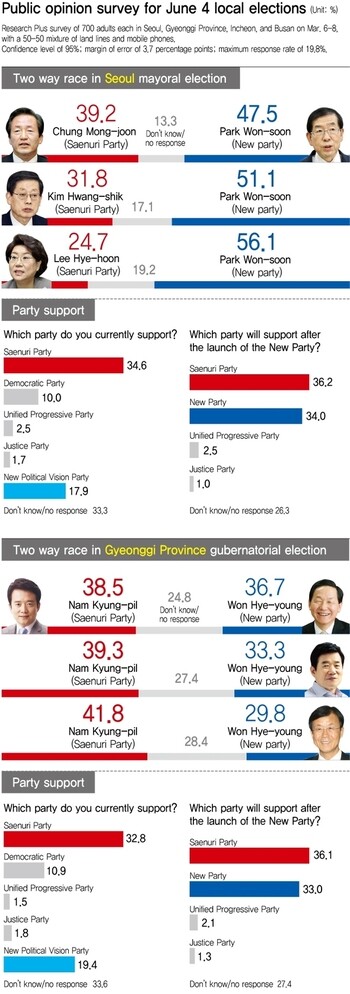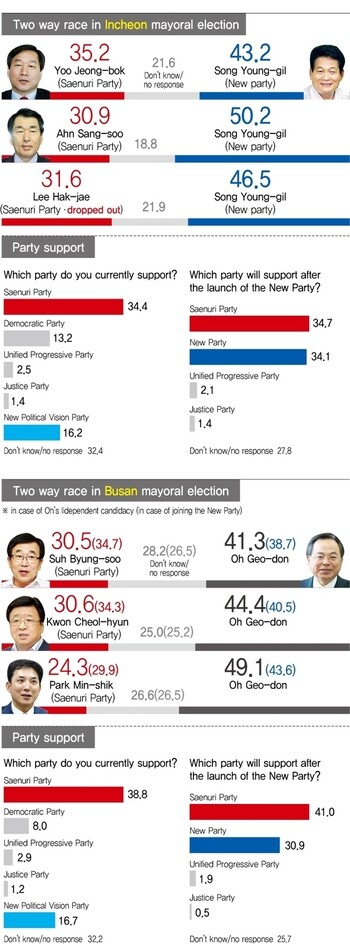hankyoreh
Links to other country sites 다른 나라 사이트 링크
Poll data shows incumbents leading ahead of local elections

By Kim Nam-il and Song Ho-jin, staff reporters
An opinion poll on the June 4 local elections shows opposition incumbent mayors and independents leading in Seoul, Incheon, and Busan.
The poll, the first conducted by the Hankyoreh after the Democratic Party (DP) and New Political Vision Party (NPVP) announced plans to merge into a coalition party, also showed Nam Kyung-pil, a lawmaker with the ruling Saenuri Party (NFP), holding an edge within the margin of error against Kim Sang-gon, a former Gyeonggi Province schools superintendent who announced his candidacy as a coalition party candidate.
For the poll, the Hankyoreh commissioned the opinion research organization Research Plus to survey residents on four metropolitan local government elections. The results, released on Mar. 10, showed current Seoul Mayor Park Won-soon leading by 8.3 percentage points in a head-to-head scenario against Chung Mong-joon, a Saenuri lawmaker and his party’s leading contender for the race. The gap had narrowed by nearly half from another Hankyoreh poll in late January, but Park continued to hold the lead.
The most closely contested race looks to be the Gyeonggi gubernatorial race, where the top contenders, Nam Kyung-pil and Kim Sung-gon, are running neck-and-neck within the margin of error. In a hypothetical two-way race, Nam was found to hold a narrow edge, leading Kim by 38.5% to 36.7%. Nam also led in another head-to-head scenario pitting him against coalition party lawmaker Kim Jin-pyo, by a margin of 39.3% to 33.3% - a larger gap, but also within the margin of error.
In Busan, Oh Geo-don was found to hold larger leads against possible Saenuri opponents as an independent than as a coalition party candidate, with margins of 6.8 percentage points against Saenuri lawmaker Suh Byung-soo and 7.6 percentage points against former Saenuri lawmaker Kwon Chul-hyun. All eyes are now on Oh, a former Minister of Oceans and Fisheries, who has yet to decide whether to join the coalition party.

For the Incheon race, the results showed the “recruitment effect” has yet to kick in for Yoo Jeong-bok, who resigned last week as Minister of Public Administration and Security and close associate of President Park Geun-hye. Yoo trailed the incumbent opposition mayor, Song Young-gil, by 8.0 percentage points in a hypothetical two-way race.
In the wake of the coalition party announcement, the Saenuri Party maintained a slight edge in party support in Seoul (36.2% to 34.0%), Gyeonggi (36.1% to 33.0%) and Incheon (34.7% to 34.1%), and a large 10 percentage point lead in stronghold Busan, with 41.0% support to the coalition party’s 30.9%. Park’s approval ratings were 59.5% in Seoul, 61.4% in Gyeonggi, 58.2% in Incheon, and 62.5% in Busan.
Meanwhile, most DP and NPVP supporters said they would “actively support” the coalition party, but signs of concern about the actual effects of the merger were very much in evidence.
In Seoul, 80.9% of DP supporters and 86.5% of NPVP supporters said they would back the new party. But when asked whether they thought the decision was right or wrong, 34.2% of Seoul respondents said it was a mistake, compared to 27.4% who approved. More respondents also characterized the merger as a “marriage of convenience” (49.5%) than a “decision made to prevent opposition disunity” (43.1%).
Analysts said the lack of confidence in the party integration's effects among opposition supporters was due to a combination of factors: concerns about them being undermined by differences during the party integration negotiations, disappointment with the decision not to launch the NPVP as its own party, and the likelihood of the Saenuri Party taking steps to turn the tide.
For the survey, Research Plus contacted 700 adults each in Seoul, Gyeonggi Province, Incheon, and Busan on Mar. 6-8, with a 50-50 mixture of land lines and mobile phones. The confidence level was 95%, with a margin of error of 3.7 percentage points and a maximum response rate of 19.8%.
Please direct questions or comments to [english@hani.co.kr]

Editorial・opinion
![[Column] Season 2 of special prosecutor probe may be coming to Korea soon [Column] Season 2 of special prosecutor probe may be coming to Korea soon](https://flexible.img.hani.co.kr/flexible/normal/500/300/imgdb/original/2024/0426/3317141030699447.jpg) [Column] Season 2 of special prosecutor probe may be coming to Korea soon
[Column] Season 2 of special prosecutor probe may be coming to Korea soon![[Column] Park Geun-hye déjà vu in Yoon Suk-yeol [Column] Park Geun-hye déjà vu in Yoon Suk-yeol](https://flexible.img.hani.co.kr/flexible/normal/500/300/imgdb/original/2024/0424/651713945113788.jpg) [Column] Park Geun-hye déjà vu in Yoon Suk-yeol
[Column] Park Geun-hye déjà vu in Yoon Suk-yeol- [Editorial] New weight of N. Korea’s nuclear threats makes dialogue all the more urgent
- [Guest essay] The real reason Korea’s new right wants to dub Rhee a founding father
- [Column] ‘Choson’: Is it time we start referring to N. Korea in its own terms?
- [Editorial] Japan’s rewriting of history with Korea has gone too far
- [Column] The president’s questionable capacity for dialogue
- [Column] Are chaebol firms just pizza pies for families to divvy up as they please?
- [Column] Has Korea, too, crossed the Rubicon on China?
- [Correspondent’s column] In Japan’s alliance with US, echoes of its past alliances with UK
Most viewed articles
- 1Is Japan about to snatch control of Line messenger from Korea’s Naver?
- 2‘We must say no’: Seoul defense chief on Korean, USFK involvement in hypothetical Taiwan crisis
- 3[Editorial] Korea’s surprise Q1 growth requires objective assessment, not blind fanfare
- 4Division commander ordered troops to enter raging flood waters before Marine died, survivor says
- 5The dream K-drama boyfriend stealing hearts and screens in Japan
- 6S. Korea “monitoring developments” after report of secret Chinese police station in Seoul
- 7[Column] Season 2 of special prosecutor probe may be coming to Korea soon
- 8No good, very bad game for Korea puts it out of Olympics for first time since 1988
- 9[Column] ‘Choson’: Is it time we start referring to N. Korea in its own terms?
- 10Is N. Korea threatening to test nukes in response to possible new US-led sanctions body?